Convention call
Late in December 1918, the leadership of the Russian Communist Party decided that the time was ripe for the convocation of a new international association of radical political parties to supplant the discredited Second International. [1] On December 24 a radio broadcast was made from Moscow calling upon the "communists of all countries" to "rally around the revolutionary Third International." [2]
Lenin sought to invite only those organizations which stood for a break with the more conservative elements in their group and who stood for immediate socialist revolution and the establishment of a dictatorship of the proletariat and a Soviet-style form of government. [2] Lenin hoped for a gathering to be held beginning February 1, 1919, either openly in Berlin or, if necessary, secretly in the Netherlands. [2] Owing to political difficulties between Soviet Russia and the rather conservative social democratic government of Germany and the eruption of civil war there, Berlin was quickly rejected as inhospitable for a foundation congress. [2]
On January 21, 1919, a meeting of about a dozen communists living in Moscow determined to hold a formal gathering in that city, to begin February 15 – little more than 3 weeks hence. [3] The formal convention call was composed by People's Commissar of War Leon Trotsky and listed invited political organizations by name. [3]
Invited organizations from the English-speaking world included "the left forces in the British Socialist Party (in particular, representatives of the Maclean current)" (a reference to John Maclean), the British Socialist Labour Party, the Industrial Workers of the World in Britain, the Industrial Workers group in Britain, "revolutionary forces in the shop stewards' movement in Britain, "revolutionary forces in Irish workers organizations," and the Industrial Workers of the World in Australia. [4]
In addition to these, from the United States were invited the American Socialist Labor Party, "left forces of the American Socialist Party (especially the current represented by the Socialist Propaganda League)," the Industrial Workers of the World in America, and the SLP-affiliated Workers International Industrial Union. [4]
Owing to communications difficulties ensuing from the Allied blockade, few organizations outside of Soviet Russia heard of the convention call in sufficient time to send delegates. About two dozen special messengers were said to have been sent out with the news, but only three or four managed to reach their destinations in time with the news. [5] The call was published in the press, however, in Soviet Russia on January 24, 1919, and in Austria and Hungary by the end of the month. [5]
Transport difficulties forced a further postponement of the gathering, with the start date moved back two weeks to March 2, 1919. [5] Despite this additional delay only two parties managed to credential delegates and to successfully get them to Moscow on time for the opening of the meeting. [6] Two prospective delegates – Fritz Platten of Switzerland and Karl Steinhardt of Austria – were arrested and briefly jailed in transit. [7]
As a result, the vast majority of those who sat as delegates to this founding congress of the Communist International had no formal status with the parties which they claimed to represent and the delegates initially decided that the session would be a preparatory conference rather than a formal foundation convention. [8] This initial decision was later overturned by the assembled delegates and the Third, Communist International was declared established.
Delegate composition
- See: List of delegates of the 1st Comintern congress.
Over the six days of the congress a total of 51 delegates were registered, representing 35 organizations in 22 countries. [8] All political tendencies in the Zimmerwald Left movement were represented at the gathering with the exception of the left wing of the International Union of Socialist Youth. [9] Most of these delegates had already been residing in Soviet Russia, however, with only 9 of those attending the founding congress managing to break through the allied blockade of the country from abroad. [10]
With regard to the English-speaking world, no representative of the various parties and tendencies of Great Britain which were invited were in attendance at the founding congress. [9] The only British representative present was Joseph Fineberg, a member of the British Socialist Party who had come to Soviet Russia on his own in 1918. [9] Fineberg received only non-voting credentials as a representative of British Communists living in Russia. [9]
From the United States there was only Boris Reinstein, a Buffalo, New York member of the Socialist Labor Party of America (SLP) who had been previously sent to Europe as the party's representative to an altogether different international conclave. Although Reinstein was granted status as a voting delegate at the congress, at no time did the SLP authorize him to act as its representative at the congress and his independent action was subsequently repudiated by the organization. Dutch engineer S.J. Rutgers, at that time a resident of the United States, sat as a non-voting delegate of the Socialist Propaganda League of America as well as holding similar status on behalf of the Dutch Social Democratic Group. [11]
There were no delegates in attendance in either a voting or consultative status from the English-speaking countries of Canada, Australia, New Zealand, or South Africa. [11]
The nationalities outside of Europe were surprisingly well represented at the founding congress, including a group of five voting delegates from the "United Group of the Eastern Peoples of Russia," a voting delegate from Armenia, as well as non-voting delegates from Turkey, Turkestan, Georgia, Azerbaijan, Persia, China, and Korea. [11] In all these 13 delegates represented fully one-quarter of the 52 voting and non-voting delegates to the gathering.
The largest and most influential delegation, not surprisingly, was that of Soviet Russia. In addition to the five delegates assigned as representatives of the various "Eastern peoples" of the former Russian empire, six regular and two consultative delegates were in attendance, including such key figures of the Russian Communist Party as Lenin, Joseph Stalin, Trotsky, Grigori Zinoviev, Nikolai Bukharin, Georgii Chicherin, V.V. Vorovsky, and Valerian Osinsky. [12]
The delegates were, in general, younger than had been typical at previous international socialist gatherings. [13] Of the 43 delegates for whom an age is known, 5 were in their 20s and 24 were in their 30s, with only the American Boris Reinstein over the age of 50. [13]

The Communist International (Comintern), also known as the Third International, was an international organization founded in 1919 that advocated world communism, and which was led and controlled by the Communist Party of the Soviet Union. The Comintern resolved at its Second Congress in 1920 to "struggle by all available means, including armed force, for the overthrow of the international bourgeoisie and the creation of an international soviet republic as a transition stage to the complete abolition of the state". The Comintern was preceded by the dissolution of the Second International in 1916. Vladmir Lenin, Leon Trotsky and Joseph Stalin were both honorary presidents of the Communist International.

The Red International of Labor Unions, commonly known as the Profintern, was an international body established by the Communist International (Comintern) with the aim of coordinating communist activities within trade unions. Formally established in 1921, the Profintern aimed to act as a counterweight to the influence of the so-called "Amsterdam International", the social-democratic International Federation of Trade Unions, an organization which the Comintern branded as "class-collaborationist" and as an impediment to revolution. After entering a period of decline in the middle 1930s, the Profintern was finally dissolved in 1937 with the advent of Comintern's "Popular Front" policy.

Yrjö Elias Sirola was a Finnish socialist politician, writer, teacher, and newspaper editor. He was prominent as an elected official in Finland, as minister of foreign affairs in the 1918 Finnish Socialist Workers' Republic, a founder of the Communist Party of Finland, and as a functionary of the Communist International.
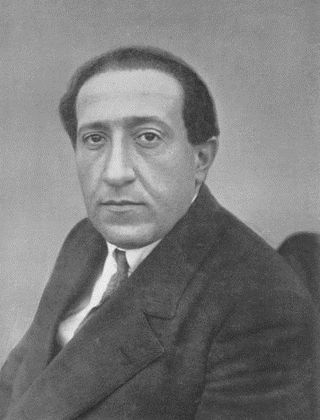
József Pogány, known in English as John Pepper or Joseph Pogany, was a Hungarian Communist politician. He later served as a functionary in the Communist International (Comintern) in Moscow, before being cashiered in 1929. Later as an official in the Soviet government, Pepper ran afoul of the secret police and was executed during the Great Terror of 1937–38.
Thomas Hargrave Bell was a Scottish socialist politician and trade unionist. He is best remembered as a founding member of both the Socialist Labour Party and the Communist Party of Great Britain and as the editor of Communist Review, the official monthly magazine of the latter.
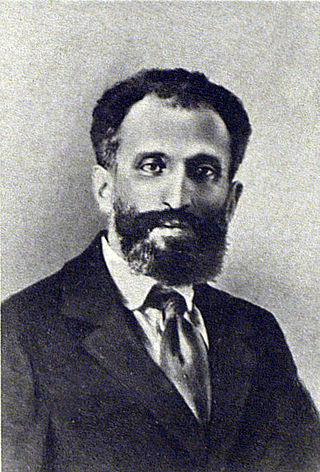
Osip Aaronovitch Piatnitsky, was a Russian revolutionary and Soviet politician. Piatnitsky is best remembered as head of the International Department of the Communist International during the 1920s and early 1930s, a position which made him one of the leading public faces of the international communist movement.
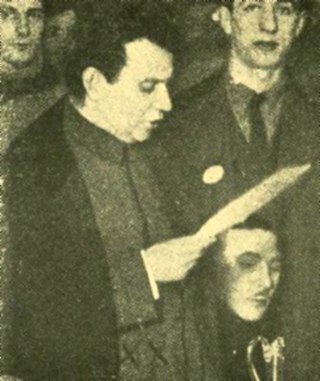
The Congress of the Peoples of the East was a multinational conference held in September 1920 by the Communist International in Baku, Azerbaijan. The congress was attended by nearly 1,900 delegates from across Asia and Europe and marked a commitment by the Comintern to support revolutionary nationalist movements in the colonial "East" in addition to the traditional radical labour movement of Europe, North America, and Australasia. Although attended by delegates representing more than two dozen ethnic entities of the Middle and Far East, the Baku Congress was dominated by the lengthy speeches of leaders from the Russian Communist Party (RCP), including: Grigory Zinoviev, Karl Radek, Mikhail Pavlovich, and Anatoly Skachko. Non-RCP delegates delivering major reports included Hungarian revolutionary Béla Kun and Turkish feminist Naciye Hanim.

The International Association of Red Sports and Gymnastics Associations, commonly known as Red Sport International (RSI) or Sportintern was a Comintern-supported international sports organization established in July 1921. The RSI was established in an effort to form a rival organization to already existing "bourgeois" and social democratic international sporting groups. The RSI was part of a physical culture movement in Soviet Russia linked to the physical training of young people prior to their enlistment in the military. The RSI held 3 summer games and 1 winter games called "Spartakiad" in competition with the Olympic games of the International Olympic Committee before being dissolved in 1937.

Herbert Moore "Harry" Wicks (1889–1956), best known as "Harry M. Wicks," was an American radical journalist and politician who was a founding member of the Communist Party of America. He was a plenipotentiary representative of the Communist International to Australia in 1930-31 and there directed the reorganization of the structure and leadership of the Communist Party of Australia.

Louis C. Fraina was a founding member of the Communist Party USA in 1919. After running afoul of the Communist International in 1921 over the alleged misappropriation of funds, Fraina left the organized radical movement, emerging in 1926 as a left wing public intellectual by the name of Lewis Corey. During the McCarthy era, deportation proceedings were initiated against Fraina-Corey. After a protracted legal battle, Corey died of a cerebral hemorrhage before the action against him was formally abandoned.

The 2nd World Congress of the Communist International was a gathering of approximately 220 voting and non-voting representatives of communist and revolutionary socialist political parties from around the world, held in Petrograd and Moscow from July 19 to August 7, 1920. The 2nd Congress is best remembered for formulating and implementing the 21 Conditions for membership in the Communist International.

Arthur Patrick L. "Pat" Quinlan (1883–1948) was an Irish trade union organizer, journalist, and socialist political activist. Quinlan is best remembered for the part he played as an organizer for the Industrial Workers of the World in the 1913 Paterson silk strike — an event which led to his imprisonment for two years in the New Jersey State Penitentiary.
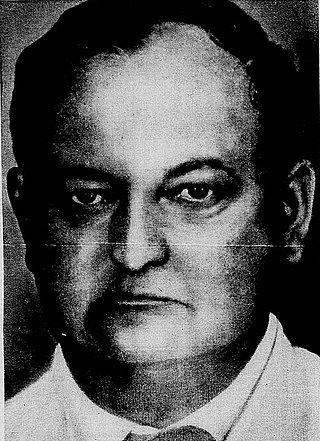
Arthur Ernest Ewert was a German communist political activist and functionary of the Communist International (Comintern). Ewert is best remembered as an official Comintern representative to the United States, China, Argentina, and Brazil during the late 1920s and 1930s. After being subjected to torture and sentenced to 13 years in prison for his political activity in Brazil, Ewert lost his sanity. He was granted amnesty in May 1945 and ultimately returned to East Germany, where he lived out the rest of his life in a series of medical facilities.
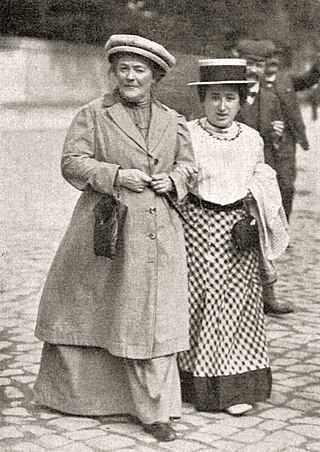
The Communist Women's International was launched as an autonomous offshoot of the Communist International in April 1920 for the purpose of advancing communist ideas among women. The Communist Women's International was intended to play the same role for the international women's movement that the Red Peasant International played for poor agrarians and the Red International of Labor Unions played for the international labor movement.

The All-Russian Congress of Soviets evolved from 1917 to become the supreme governing body of the Russian Soviet Federative Socialist Republic from 1918 until 1936, effectively. The 1918 Constitution of the Russian SFSR mandated that Congress shall convene at least twice a year, with the duties of defining the principles of the Soviet Constitution and ratifying peace treaties. The October Revolution ousted the provisional government of 1917, making the Congress of Soviets the sole, and supreme governing body. This Congress was not the same as the Congress of Soviets of the Soviet Union which governed the whole Soviet Union after its creation in 1922.
Avetis Sultanovich Sultan-Zade (1889–1938) was a Persian-born ethnic Armenian communist revolutionary and economist, best remembered as one of the founders of the Communist Party of Iran. Sultan-Zade was a delegate to the Second World Congress of the Communist International in 1920 and was for a time one of the leading figures of the Marxist revolutionary movement in the so-called "East." Following his demotion from the leadership of the Iranian Communist Party and the Comintern in 1923, Sultan-Zada lived in the Soviet Union where he worked as a government functionary in the banking industry.
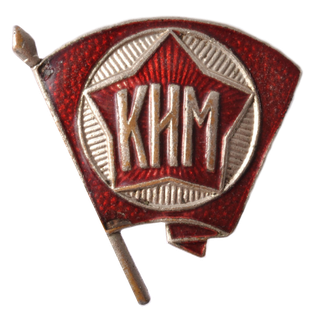
The Young Communist International was the parallel international youth organization affiliated with the Communist International (Comintern).
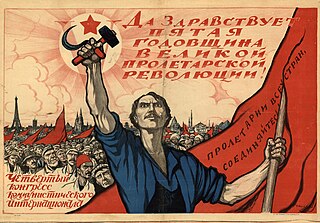
The 4th World Congress of the Communist International was an assembly of delegates to the Communist International held in Petrograd and Moscow, Soviet Russia, between November 5 and December 5, 1922. A total of 343 voting delegates from 58 countries were in attendance. The 4th World Congress is best remembered for having amplified the tactic of the United Front into a fundamental part of international Communist policy. The gathering also elected a new set of leaders to the Comintern's governing body, the Executive Committee of the Communist International (ECCI).

The Executive Committee of the Communist International, commonly known by its acronym, ECCI (Russian acronym ИККИ - for Исполнительный комитет Коммунистического интернационала), was the governing authority of the Comintern between the World Congresses of that body. The ECCI, established by the Founding Congress of the Comintern in 1919, was dissolved with the rest of the Comintern in May 1943.

The Seventh World Congress of the Communist International (Comintern) was a multinational conference held in Moscow from July 25 through August 20, 1935 by delegated representatives of ruling and non-ruling communist parties from around the world and invited guests representing other political and organized labor organizations. The gathering was attended by 513 delegates, of whom 371 were accorded full voting rights, representing 65 Comintern member parties as well as 19 sympathizing parties.

















